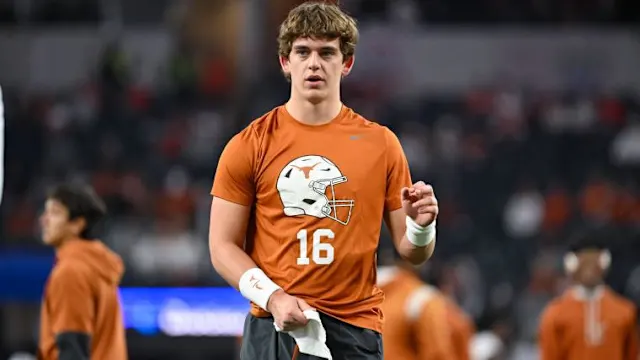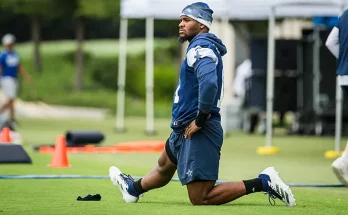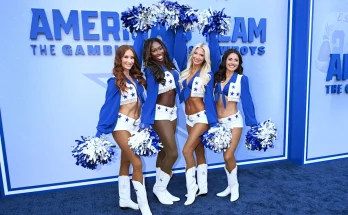The Manning name in football carries a legendary weight that stretches across generations, and when the conversation turns to quarterbacks, few families in sports history have produced such sustained excellence. Archie Manning, the patriarch, was a star at Ole Miss before carving out a long, respected career in the NFL. His sons, Peyton and Eli, became icons in their own right, each with Super Bowl victories and Hall of Fame credentials that further solidified the Manning legacy. Now, with Arch Manning, the latest prodigy from the bloodline stepping onto the grand stage at the University of Texas, the question naturally emerges: could he become the first in his family to win the most prestigious individual award in college football, the Heisman Trophy? That possibility is tantalizing for fans, and it’s one that deserves a deeper exploration not only of Arch’s potential but also of the legacy he carries and the challenges ahead.
To appreciate the magnitude of such a goal, it’s important to understand the historical context. Despite the greatness of Archie, Peyton, and Eli, none ever hoisted the Heisman Trophy. Archie Manning came close during his college days at Ole Miss, finishing in the top five of voting, but he never captured the award. Peyton Manning was long considered a frontrunner during his illustrious career at Tennessee, especially in 1997 when he seemed destined to win. However, Charles Woodson, Michigan’s do-it-all defensive back and return man, edged him out in one of the most debated Heisman races in history. Eli, meanwhile, had a strong career at Ole Miss and later became a two-time Super Bowl MVP in the NFL, but the Heisman was never truly within his grasp. Thus, a remarkable irony persists: for all their talent, records, and legendary status, no Manning has ever been able to call themselves a Heisman winner. Arch, with his youth, talent, and the changing nature of college football, now carries the opportunity to change that narrative.
Arch Manning came into Texas as one of the most hyped recruits in modern history, with comparisons that stretched from his own family tree to the best quarterbacks the college game had seen. As the nephew of Peyton and Eli and the grandson of Archie, his surname already placed him under the brightest of spotlights, but his actual play on the field at the high school level showed why he was rated as one of the top quarterback recruits in the nation. His decision to commit to the Texas Longhorns was itself a seismic event in college football, signaling that the program under Steve Sarkisian was regaining its pull among elite talent. The anticipation of his development has been enormous, and with every snap, the chatter grows louder about whether he might not just follow in the footsteps of his uncles but actually surpass them at the college level in terms of accolades.
The Heisman Trophy is not simply about individual talent; it is about narrative, timing, and team success. Historically, quarterbacks from programs in contention for national championships have the clearest path to the award. For Arch, this dynamic could work in his favor. Texas, now positioned as a contender in the expanded College Football Playoff era and moving into the SEC, finds itself on the biggest stages with the largest audiences. The exposure that comes with leading the Longhorns back to consistent prominence provides him a massive platform to showcase his abilities. If Arch can translate his tools into production—arm strength, poise, mobility, and decision-making—while guiding Texas to wins against powerhouse programs, his candidacy could quickly move from hypothetical to very real.
At the same time, the pressures on Arch Manning cannot be overstated. Every throw, every game, every season will be dissected more intensely than perhaps any quarterback in college football history. That scrutiny can be both a burden and a motivator. The Manning family has long handled expectations with remarkable grace, but being the first of the lineage with a chance to claim the Heisman comes with unique psychological weight. Unlike Peyton and Eli, who each carved out their own paths at Tennessee and Ole Miss, Arch is viewed as the one who can potentially “complete the circle” by bringing the Heisman into the Manning household. This magnifies every performance and sets an almost unfair standard. Yet, greatness in sports often requires embracing these very pressures.
The competition for the Heisman in modern college football is fierce. In recent years, we’ve seen winners like Caleb Williams, Bryce Young, DeVonta Smith, and Joe Burrow rewrite the expectations for the type of performances required. Quarterbacks today are often judged not just on wins and losses but on statistical dominance—4,000-plus yards, 40 or more touchdowns, and moments of undeniable brilliance in marquee games. Arch Manning, in order to secure the award, will likely need to post video-game-level numbers while also thriving in high-pressure environments such as rivalry showdowns and playoff-deciding games. Fortunately, the offensive system under Sarkisian is designed to maximize quarterback play, with creative schemes and opportunities to spread the field, which could help Arch pile up the kind of numbers voters notice.
Another factor to consider is how the Manning name itself impacts Arch’s candidacy. On one hand, it provides unparalleled visibility. Media attention and storylines are critical in Heisman voting, and no player in the sport commands more natural coverage than a Manning. Every positive moment on the field will be magnified into a headline, and the narrative of “the first Manning to win the Heisman” will practically write itself if his performance justifies consideration. On the other hand, the same visibility can backfire if he struggles. The microscope is merciless, and fair or not, the Manning name raises expectations to almost unattainable levels. Arch will have to demonstrate not just flashes of brilliance but sustained excellence to keep voters invested in the idea of him as a legitimate candidate rather than a media-fueled storyline.
The broader college football landscape also plays a role. With the transfer portal and NIL reshaping the sport, competition is more dynamic than ever. Talented quarterbacks are spread across the country, from traditional powers like Alabama, Georgia, and Ohio State to rising programs eager to break into the national spotlight. For Arch, consistency will be key, but so too will be signature moments—the kinds of performances where the entire nation watches and leaves with no doubt about who the best player on the field was. Heisman winners often have “Heisman moments,” such as Desmond Howard’s punt return pose, Johnny Manziel’s jaw-dropping plays against Alabama, or Joe Burrow’s surgical dismantling of top-ranked opponents. Arch will need his own defining plays to etch himself into the collective memory of voters.
It’s also worth considering the historical irony if Arch does become the first Manning to win the Heisman. Peyton, for all his records and brilliance, famously fell short, and to this day, many believe he was snubbed in 1997. Eli, though never quite on that same level in college, went on to achieve legendary NFL moments, particularly with his Super Bowl victories. Archie, meanwhile, was adored and admired but played for an Ole Miss team that never quite gave him the platform needed to secure the trophy. If Arch were to win it, he would both honor and redefine the family legacy, succeeding where his predecessors could not. It would not diminish their greatness but rather expand the family’s lore into new territory, bridging past and present in a way few sports families ever experience.
The road to the Heisman for Arch Manning will not be easy, but it is undeniably possible. His talent, the offensive system at Texas, and the program’s rising trajectory give him the ingredients to make a run. What remains to be seen is how he handles the adversity that inevitably comes, whether from tough losses, personal struggles, or the constant glare of expectations. College football history is filled with hyped quarterbacks who never quite reached the mountaintop, but it is also filled with those who rose to the moment and defined eras. Arch Manning sits at the crossroads of both possibilities.
If he succeeds, the story will be one for the ages: the grandson of Archie, the nephew of Peyton and Eli, the heir to one of football’s greatest dynasties, finally capturing the one prize that has eluded the Manning family. It would be a symbolic passing of the torch, not just within his family but within college football itself, where the Heisman remains the ultimate recognition of individual greatness. If he falls short, he will still be measured against impossibly high standards, but the attempt alone ensures that he will remain one of the most watched and discussed players of his generation.
Ultimately, the question of whether Arch Manning can become the first in his family to win the Heisman is one that blends legacy, talent, and opportunity. The potential is there, the platform is massive, and the narrative is irresistible. What remains is execution, growth, and the ability to seize the biggest moments when they come. In the end, that is what the Heisman has always rewarded—not just excellence, but unforgettable excellence. Arch Manning, carrying the weight of his name and the hopes of Longhorn Nation, may yet find himself in New York, hoisting the trophy that has long eluded his legendary family. And if he does, it will be one of the most fitting, remarkable chapters in the long and storied history of college football.



